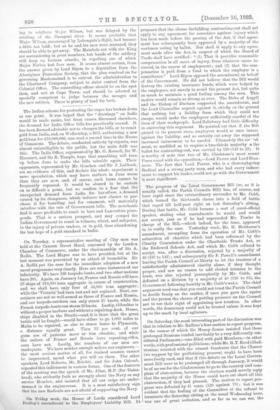The Indian scheme for protecting the rupee has broken down
at one point. It was hoped that the " drawings " on India would be made easier, but from causes discussed elsewhere, the demand for India Office bills has practically ceased. It has been deemed advisable not to cheapen the bills, or to remit gold from India, and, on Wednesday, a Bill, authorising a new gold loan for 210,000,000, was read a second time in the House of Commons. The debate, conducted entirely by experts, was almost unintelligible to the public, but the main drift was this. The India Office, represented by Mr. G. Russell, Sir W. Harcourt, and Sir R. Temple, hope that something will turn up before June to make the bills saleable again. Their opponents, represented by Mr. Goschen and Sir J. Lubbock, see no evidence of this, and declare the whole experiment a, mere speculation, which may leave matters in June worse than they are now, and, of course, such loans cannot be frequently repeated. It would be absurd to be certain on so difficult a point, but we confess to a fear that the unexpected demand from India for bar-silver, a demand caused by its cheapness, whieh induces new classes to pur- chase it for hoarding and for ornament, will material;y interfere with the sale of Government bills. The merchants find it more profitable to remit in bars and Lancashire piece- goods. That is a serious prospect, and may compel the Indian Government to remit in tobacco, wheat, and saltpetre, to the injury of private traders, or in gold, thus abandoning the last hope of a gold standard in India.










































 Previous page
Previous page